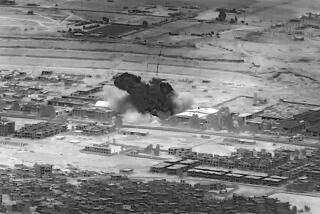Iraqi Militia, Coalition Forces Clash
- Share via
BAGHDAD — Fighters loyal to a radical Shiite Muslim cleric staged bloody attacks in central and southern Iraq on Saturday in the wake of the U.S. military’s deepest foray into the holy city of Najaf a day earlier. More than three dozen insurgents were reported killed in the skirmishes.
U.S. military officials said that five soldiers had died Friday evening or Saturday. Three of them were killed while fighting rebels, one died in a vehicle accident, and the other died of “natural causes.”
Spurred by claims that U.S. gunfire had damaged the golden dome of Najaf’s shrine of Imam Ali, militia members fighting on behalf of cleric Muqtada Sadr lashed out in the Baghdad slum of Sadr City, the city of Karbala and marshlands in the deep south. Coalition spokesmen adamantly denied damaging the shrine, which Shiites revere.
Insurgents in the northern city of Mosul also launched a mortar attack on an Iraqi army recruiting center, killing four Iraqis.
The violence comes days after coalition forces and Sadr representatives appeared poised to strike a deal that would have allowed Sadr to leave Najaf, where he has been holed up for weeks. But at a news briefing Saturday, a spokesman for the coalition insisted that it had received no such peace proposal and renewed its call to bring Sadr to trial in connection with the assassination of a rival cleric.
“He must face justice,” said Dan Senor, chief spokesman for L. Paul Bremer III, the U.S. administrator in Iraq.
Civil and religious leaders in Najaf had said last week they had reached an agreement that would have transformed Sadr’s militia into a political force and put off the criminal case against Sadr until after June 30, when the United States is scheduled to hand over sovereignty to Iraqis.
Sadr’s representatives said Friday that the U.S. military’s claim that it was “seeking a peaceful solution” was a lie and vowed that American troops who approached the shrine would face “time bombs.” On Saturday, scattered gunfights echoed through Najaf, while gunmen from Sadr’s Al Mahdi army patrolled the center of the city and clusters of armed men stood guard on most street corners around the shrine.
Insurgents in Baghdad’s Sadr City attacked U.S. troops with rocket-propelled grenades, damaging several vehicles. In all, U.S. forces in Baghdad killed 18 insurgents and wounded three, coalition forces reported. No U.S. soldiers were wounded, the coalition said.
American jets had bombed the outskirts of Sadr City overnight, and on Saturday afternoon U.S. Army vehicles rumbled through the district, handing out fliers urging people to hand over their firearms for cash.
Also, in Baghdad’s Adhamiya district, U.S. troops raided the capital’s largest mosque, Abu Hanifa, in search of weapons. The mosque is a Sunni one, known for its support of the uprising in Fallouja. No weapons were found.
In southern Iraq, where the desert gives way to a once-vast marshland, British soldiers killed as many as 16 insurgents after their patrol was ambushed between Amarah and Basra, according to military authorities. Two British soldiers were wounded.
In Karbala, south of Baghdad, at least four insurgent fighters died in fighting near the shrines of Imam Hussein and Imam Abbas -- sites also revered by Shiites. Hearing gunfire, many residents locked themselves inside their homes and kept their children home from school.
In Mosul, mortar shells landed in a crowd of men waiting to sign up for the Iraqi Civil Defense Corps, killing four and injuring 19. In northern Iraq, where coalition authorities have aggressively recruited and trained Iraqi police and defense forces, insurgents have targeted those volunteers as a way of undermining support for the programs.
At a Mosul hospital Saturday, men injured in the attack lamented their situation.
“I heard a very strong boom, and now I am in the hospital,” said Sami Mahmoud, 27. “I am actually poor; this is my only opportunity to work. Why are they fighting the poor ... while the rich, the officials and the high-profile positions are not affected at all? Why?”
Times staff writer Patrick J. McDonnell in Baghdad and special correspondents Roaa Ahmed Shawkat in Mosul and Saad Fakhrildeen in Najaf contributed to this report.
More to Read
Sign up for Essential California
The most important California stories and recommendations in your inbox every morning.
You may occasionally receive promotional content from the Los Angeles Times.










